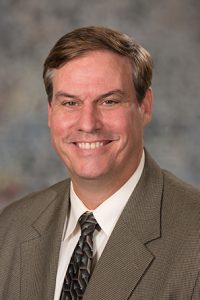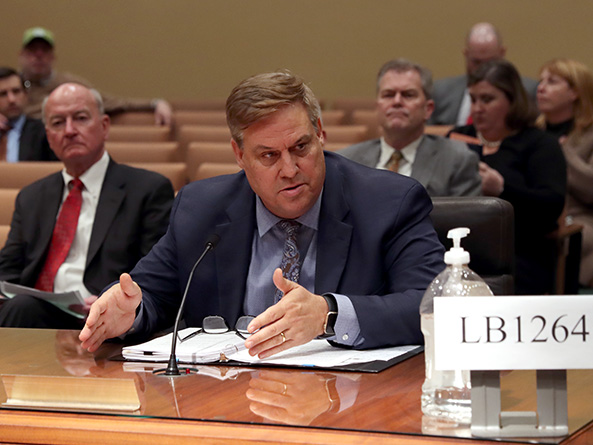Proposal seeks to modernize Nebraska’s tax system
Nebraskans with taxable income of less than $50,000 would pay no state income tax under a proposal heard Feb. 23 by the Revenue Committee.
Omaha Sen. Mike McDonnell, sponsor of LB1264, said the proposal is based on a tax modernization plan from the Blueprint Nebraska initiative.
McDonnell said the changes are intended to grow the state’s economy by helping Nebraska compete with other states for middle class residents needed to fill current job openings.
The bill would reduce the number of individual income tax brackets from four to two beginning in tax year 2022. The lower bracket, with a rate of 0 percent, would apply to taxable income of up to $49,999 for single individuals and up to $99,999 for those married filing jointly.
The higher bracket would apply to taxable income above those amounts. Beginning in tax year 2022, the top individual income tax rate would be 5.6 percent, down from the current 6.84 percent. The rate would fall to 5.3 percent in tax year 2025 and 4.99 percent in tax year 2028.
The bill also would cut the state’s corporate income tax rates. Beginning in tax year 2022, it would set the bottom rate, which applies to the first $100,000 of taxable income, at 4 percent, down from the current 5.58 percent.
It would set the top rate, which applies to income in excess of $100,000, at 5.6 percent, down from 7.5 percent, beginning in tax year 2022. Like the top individual income tax rate, it would fall to 4.99 percent by tax year 2028.
McDonnell said LB1264 would end several sales tax exemptions on services to offset revenue lost due to the income tax cuts. These would include entertainment admissions, personal services and the cleaning, maintenance and repair of motor vehicles and real property.
The bill also would impose state sales tax on 20 percent of the gross income received for the services of physicians, dentists, optometrists and chiropractors and 40 percent of the gross receipts from the sale, lease or rental of durable medical equipment.
LB1264 would end the inheritance tax, repeal standard and itemized deductions and double the value of two tax credits for business expenses related to research and development.
The bill states legislative intent to create two student loan relief programs for graduates in certain in-demand fields and end most tax incentive programs to offset revenue losses resulting from the bill’s changes.
Lance Fritz, CEO of Union Pacific Railroad, testified in support of the proposal, saying it is intended to “jumpstart” a conversation about tax policy. He said LB1264 would broaden the state’s sales tax base to account for the fact that services now make up a larger portion of the economy than they did in the past.
Jim Smith of the Platte Institute also testified in support. He said an independent economic analysis estimates that the changes in LB1264 would attract or retain 70,000 residents over 10 years, including 25,000 people in the 18 to 34 age range.
Smith said the bill would increase Nebraska’s gross state product by $65 billion and generate $40 billion in personal income growth. Additionally, he said, individuals in the lower personal income tax bracket would receive the greatest percentage of tax reduction under the plan.
Testifying in opposition to LB1264 was Tiffany Friesen Milone of OpenSky Policy Institute. She said the bill would reduce state tax revenue by more than $1.3 billion annually while failing to generate the promised economic growth.
Additionally, Friesen Milone said, the proposal would shift the burden for paying for government services onto low- and middle-income Nebraskans because they pay a larger percentage of their income in sales taxes than high-income residents.
Dexter Schrodt testified in opposition to the bill on behalf of the Nebraska Medical Association. If LB1264 passes, he said, Nebraska would be the only state other than Minnesota that imposes sales tax on medical services.
Schrodt said the proposal would result in increased health care costs for Nebraskans in part because physicians likely would charge a per-visit fee to cover the cost of the new taxation requirement.
Also in opposition was Korby Gilbertson, who testified on behalf of more than a dozen organizations representing businesses that would be affected by the repeal of sales tax exemptions on services they provide.
She said LB1264 likely would lead to higher home, auto and health insurance premiums.
The committee took no immediate action on the bill.


